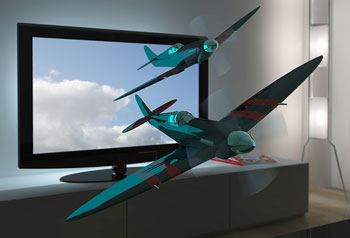Korean TV manufacturer Samsung Electronics and California-based 3D specialist RealD have jointly developed a new three-dimensional LCD display technology that will deliver full HD 3D resolution to both eyes despite the use of polarized 3D glasses. Both parties have signed an agreement which paves the way for the panels to be manufactured as well as licensed to other HDTV makers.

Although the exact details remain sketchy at this time of writing, the new technology from Samsung and RealD purportedly combines the best traits of both active and passive 3D TV technologies. Currently, active 3D has the upper hand in terms of resolution (in that it is capable of sending 3D full HD image to each eye), but its accompanying active-shutter glasses are not as appealing to consumers as the ones offered by the passive 3D camp. The polarized glasses that come with passive 3DTV sets are typically cheaper, lighter and more convenient to use (they do not require batteries, synchronisation nor charging), but the coating on film-type patterned retarder (FPR) LCD screens halves the resolution transmitted to each eye, which may result in visible scan lines and jagged edges upon closer inspection.
Samsung and RealD claim that they have devised a way to preserve full HD 3D resolution even with the use of polarized 3D glasses: the trick is to implement the active-shutter technology on the LCD panel instead of on the eyewear. By syncing the alternating left-and-right frames on the television itself, full high-definition resolution can still be appreciated by viewers in both eyes without any flicker through the circularly polarised 3D glasses (which are similar to those handed out at 3D cinemas).
The new tri-dimensional display technology is endorsed by no less a 3D grandmaster than James Cameron, the visionary director of the Avatar 3D movie which sparked the film industry’s and the public’s interest in 3D. Commenting as a member on RealD’s board of directors, he said the potent combination of 3D full high-def viewing (as intended by filmmakers) and the comfort plus practicality of RealD cinema 3D glasses will set a new standard for 3D entertainment at home.
Samsung and RealD said the technology will initially be deployed on 23-inch and 27-inch TFT-LCD computer monitors by early next year. Following successful roll-out on PC displays, the companies plan to offer the technology on large HDTVs measuring 55 inches in diagonal screen size. Details on pricing as well as availability of other panel sizes will be announced in due course.